NFL
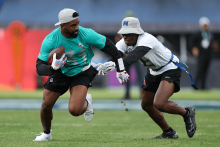
On Sunday, I tuned in to watch my first football game in over a year as part of my discipline toward Christian nonviolence. That may seem odd, especially since I’m the person who wrote about quitting the NFL as an act of nonviolence just last year. But this weekend I tuned in for the NFL’s Pro Bowl competition, including the flag football game, to signal my support for player safety and wellbeing.

EARLY IN THE 2022 NFL season, I watched as the Miami Dolphins quarterback Tua Tagovailoa suffered a second head injury in the span of five days. Although the NFL would not admit the first of those was a concussion, it was painfully clear that Tagovailoa suffered serious brain trauma.
In that moment, I felt the culmination of years’ worth of fretting over the sport I loved and its relationship to head injuries. I determined then and there on a Thursday night that I would quit the NFL. Why? The NFL is violent — and Christians are called to peace.
The league is unrepentant and unaccountable in its abuse of the brains and bodies of its players, and no amount of reform can change that. I am convicted that if I am to love my neighbors — if I am to love God — then I must resist the NFL.

A fringe Christian ideology helped stoke an out-of-control gun culture. People of faith are working to take back the conversation.
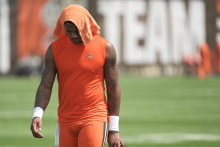
The question, for all of us, is what do abusers gain by offering vague apologies? What are they trying to achieve? The men and their supporters are attempting to weaponize a Christian culture of unending forgiveness. While forgiveness is indeed a virtue, it should never come at the expense of those harmed. [John] Crist and [Deshaun] Watson (and their colleagues) refuse to properly repent, apologize, or seek to repair the harm they are accused of. Instead, they ask their victims — and us — to move on.
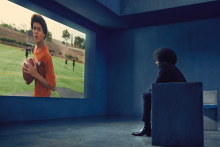
The six-episode series available to stream on Oct. 29 is the co-creation of Kaepernick and celebrated director Ava DuVernay (Selma, 13th, When They See Us). The series tells the story of Kaepernick’s teen years, when he grew both as an athlete and an individual. Kaepernick must repeatedly decide if he’s going to be true to himself or to who others want him to be, whether it’s how he wears his hair or what sort of future he pursues. It’s a relatable coming-of-age story, but the racial dynamics that Kaepernick confronts make for a more complicated high school narrative.

“NO KNEELING!” So tweets our “dominate-the-streets” president in response to white football star Drew Brees voicing support for fellow players who take a knee during the national anthem to protest police violence. This, while demonstrations swell across the country in response to the murder of George Floyd by an officer who drilled his knee into Floyd’s neck for almost 9 minutes while the man lay face down on the ground, defenseless and dying.
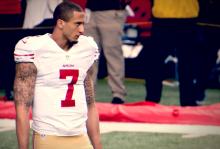
THOMAS KUHN INTRODUCED the term “paradigm shift” into common parlance in the 1960s. New paradigms teach us to see the world differently. When we receive a new paradigm, all the data flees the old one and settles into the new. For Kuhn, the classic example of a paradigm shift is the way Copernicus’ solar-centered model of the world displaced Ptolemy’s Earth-centered theory during the European Renaissance.
I knew all of that. But when Irish poet Micheal O’Siadhail referred to Copernicus as “Copernik” in his recent release, The Five Quintets, it set me toward a new thought. “Copernik” (first name Nicolaus) sounds a lot like “Kaepernick” (first name Colin).
It followed for me that Copernik (with his solar-centered hypothesis) and Kaepernick (with his refusal to stand during the national anthem at NFL games) were up to the same thing. Both performed new paradigms. While Copernik’s is now settled theory, Kaepernick’s remains highly contested. It is, moreover, highly contested precisely because it is a new paradigm that threatens everything invested in the old paradigm.
The old paradigm, so treasured in the NFL, consists in a drama of violence, money, and sex (covered by pseudo-nationalism). It provides for rich white “owners” to stage violent struggles between mostly black players. That old paradigm requires black players to conform to the ideology of white owners who use the U.S. flag to legitimate their enormous wealth and control, as if these were somehow patriotic. And because the liturgy of sex-money-violence-nationalism has become so ordinary and routine, no one notices it—exactly how the owners prefer.
Now comes Colin Kaepernick with a new paradigm that asserts that black players are free agents who are not “owned” and who do not need to participate in, collude with, or endorse the owner’s ideology.

Although there are terrible examples of abusive coaches, most coaches instill their players with respect for rules, officials, and the opponent, encouraging selfless teamwork and giving more playing time to those working harder in practice. Studies show that athletic performance improves when athletes perceive coaches to be fair. And this formative influence can last for decades: NBA legend Kareem Abdul-Jabbar credits his former college coach, John Wooden, for providing the guidance that led Abdul-Jabbar to become a successful basketball player and lifelong justice advocate. “Coach Wooden taught me a lot about basketball through his words,” writes Abdul-Jabbar. “But more important, his example as a man of unbending moral strength taught me how to be the man I wanted to be—and needed to be.”

Editors’ note: This article appeared in Sojourners magazine in 2018. In 2020, a Washington Post article by Will Hobson raised concerns about some of Bennet Omalu’s conclusions on chronic traumatic encephalopathy (CTE). Ongoing research suggests that CTE is a risk for NFL players, but the rate and severity of the brain disease among football players is still being studied.
DR. BENNET OMALU is well-acquainted with gruesome deaths. “Some people wake up in the morning, put on their suits, go to offices, and to do things associated with life, with living. But me,” Omalu says from behind the office desk in his Sacramento-area home, “I dress up, I go to work to do things associated with the greatest weaknesses of [humanity].”
A forensic pathologist and neuropathologist who earned degrees in his native Nigeria and in various schools across the U.S., Omalu was most recently in the news for performing an independent autopsy on Stephon Clark, an unarmed black man killed in his own backyard. Omalu’s work confirmed that Clark was shot in the back six times by Sacramento police.
Omalu is best known, however, for the startling discovery he made after performing an autopsy on former NFL player Mike Webster. As chronicled in the 2015 film Concussion, with Will Smith starring as Omalu, the then-medical examiner in Pittsburgh found Webster had chronic traumatic encephalopathy, a degenerative brain disease caused by repeated blows to the head—the kind of blows to the head you ought to expect when playing tackle football.
But despite his daily proximity to death, Omalu, a committed Catholic, has nothing but gratitude. “I am blessed because I encounter death every day ... I came to the world naked, cold, and lonely, and I will leave the world alone, cold, and lonely,” he explains. “When you realize that, you begin to think of powers, realities, dimensions that are beyond you.”
Omalu is precise and careful with his words. When he says, “I let the Spirit of God percolate into my being,” I half expect to hear his celestial brew bubble. “Everything I do, I do through the eyes of faith.”
Omalu doesn’t seem to be exaggerating; his Christian beliefs and morals permeate his outlook on everything. Early in our conversation, he asks if I’m a Christian writer, and I try to say I’m more like a Christian who writes, but Omalu isn’t one to thread the needle between competing postmodern definitions of Christian vocation. The Bible on his desk is as important to him as any medical textbook—and based on its proximity to his laptop, he might use the Bible more often.
And it’s with this same precision that Omalu offers an uncompromising assessment of the sport running U.S. recreational life each Saturday and Sunday (plus Monday nights on ESPN, Fridays if you’re in high school, and it’s even trying to make Thursdays a thing) for about six months out of the year.

The NFL holds Sunday church services for half the year, with various revivals during the other six months. In various intersecting ways, those four spiritualities are integrated as liturgy during every service. And the national anthem is its worship song.
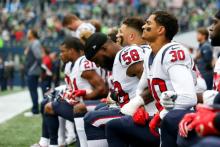
In the 2016 season, many players followed in the footsteps of San Francisco 49ers quarterback Colin Kaepernick, who began kneeling during the national anthem as a form of protest against police brutality and racial inequality sparking a national debate.
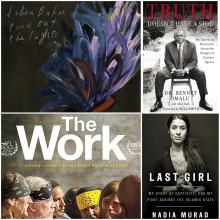
Faith in the Dark
Indie rock singer and Memphis native Julien Baker examines sexual identity, Christianity, and mental health in her latest album, Turn Out the Lights. Influenced by the Episcopal Church’s Book of Common Prayer, Baker’s album is a meditation on empathy and unity. Matador Records
Memoir of Survival
Nadia Murad was just 21 years old when she was forced into the ISIS slave trade in northern Iraq. Now a human rights activist, Murad details her narrow escape in The Last Girl: My Story of Captivity, and My Fight Against the Islamic State. Tim Duggan Books

Mike Pence is following President Trump, but he is utterly failing at following Jesus.
Mike Pence’s actions during the football game had nothing to do with the love and justice Jesus calls his followers to strive for.
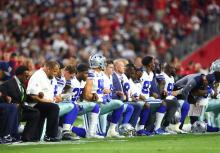
Trump’s mythical narrative is a lie because he’s wrong about the motivations of the NFL players who kneel during the national anthem. They don’t kneel because they hate the flag. They aren’t monsters threatening the United States. They kneel because they love the flag and the ideals for which it stands.
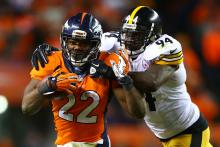
For all the headlines about football violence, concussions, and player injuries, watching football is not a “guilty pleasure” for many Americans. It’s just a pleasure, a new survey finds. The Public Religion Research Institute/Religion News Service survey, released Jan. 28, also found overwhelming support for “allowing football coaches at public high schools to lead their players in specifically Christian prayer during games.”

Teams around the NFL paid tribute to those who lost their lives in the terrorist attacks in France last week with a moment of silence before Sunday’s games.
At Lambeau Field, before the Green Bay Packers lost to the Detroit Lions 18-16, a fan shouted out a slur against Muslims during the moment of silence.
That did not sit well with Green Bay quarterback Aaron Rodgers, who called out the fan in his postgame comments.
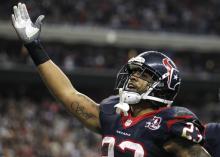
Earlier this month, NFL star Arian Foster, a running back for the Houston Texans, sent ripples through the world of professional football when he came out as a nonbeliever in the pages of ESPN Magazine.
Though he is not exactly an atheist — Foster told reporter Tim Keown he shuns that label and believes in "nothing" — Foster offered a counternarrative to the overwhelmingly Christian world of professional football and the college football system that feeds it.
"Everybody always says the same thing: You have to have faith," Foster, who is 28, says in the magazine.
While there are certainly other football players with nontraditional religious beliefs, Foster is the only active professional football player who has been open about his nonbelief.
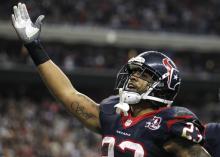
Professional football isn’t known for being a place that encourages deep intellectual reflection. With its history of silence on head injuries, locker-room harassment, and macho culture, the NFL would be the last place you would expect to find a philosopher and a poet — and an atheist to boot.
But all of those things come together in Houston Texans running back Arian Foster, who is the subject of a feature in ESPN The Magazine’s Aug. 18 College Football Preview Issue, published late last week. He revealed that he didn’t believe in God. That’s unusual in a league where players regularly point to the sky (never mind the questionable theology behind the assumption that heaven is somewhere up in the sky) and meet for regular Bible studies.
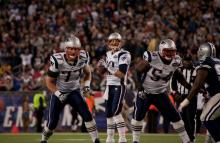
This isn’t just about Tom Brady. As much as I may hate the guy, he and I have some things in common. Rhoden is pointing to a crisis that all humans face. No matter how successful we appear, we all face the same existential lack of being. I can have all the success and money in the world, but I will still feel an emptiness in my soul.
Why do we experience this lack of being? Because we are constantly comparing ourselves with others. This comparison leads us to believe that we aren’t enough, that we lack something within ourselves, and so we try to obtain something that will fill the void within our soul.
1. ‘A Rape on Campus:’ What Went Wrong?
Columbia University’s Journalism school released its report detailing the journalistic failures of Rolling Stone’s viral story ‘A Rape on Campus,’ which initiated, and later may have stifled, an honest conversation about the prevalence rape on college campuses. Read the full report. “[Writer Sabrina Rubin] Erdely and her editors had hoped their investigation would sound an alarm about campus sexual assault and would challenge Virginia and other universities to do better. Instead, the magazine's failure may have spread the idea that many women invent rape allegations.”
2. The Courage of Bystanders Who Press ‘Record’
“Despite the fact that the world can now see Eric Garner being killed by an illegal chokehold — despite the fact that New York City Police Department banned chokeholds years ago — film of the incident did not result in the officer, Daniel Pantaleo, being charged. But thanks to the efforts of Ramsey Orta, who filmed Garner’s death, we know.”
3. Hope but Verify: The Iran Nuclear Framework
“House Speaker John Boehner recently said this about the broader instability in the Middle East: 'The world is starving for American leadership. But America has an anti-war president.' In the context of our faith — or even in the context of conservative ideals — is leadership that prevents war something to be maligned?”
4. How the Presidential Candidates Found Their Faith
“This season’s crop of presidential candidates reflects this country’s many contradictions in faith.” Newsweek explores the faith backgrounds of the apparent 2016 field so far.